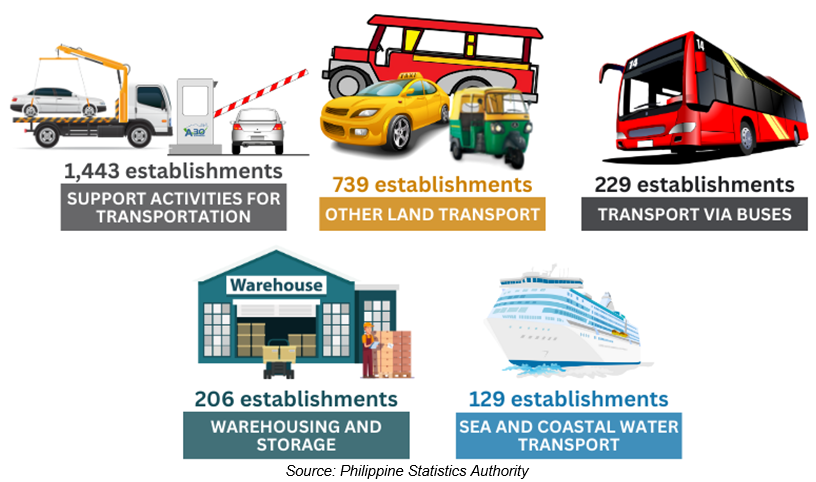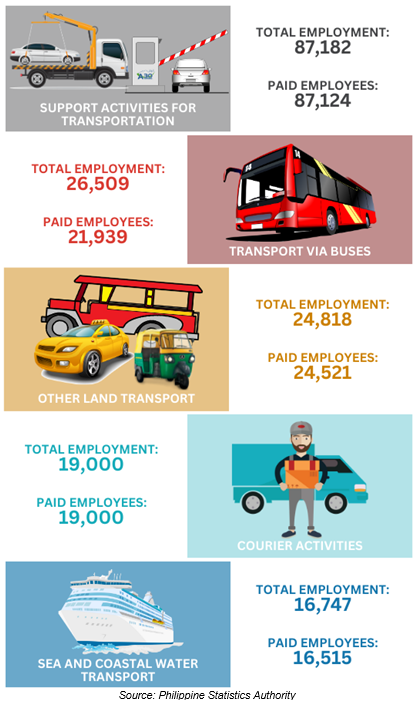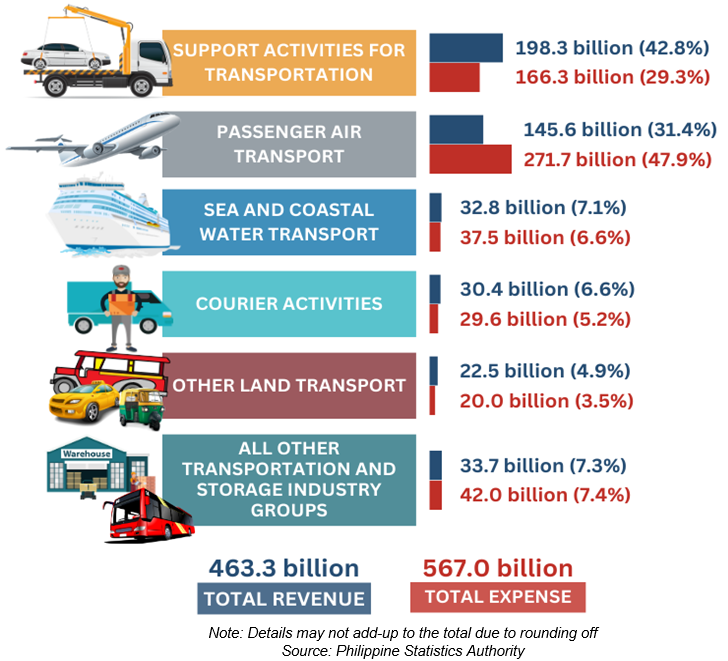The Annual Survey of Philippine Business and Industry (ASPBI), one of the designated statistical activities of the Philippine Statistics Authority (PSA), generates essential statistics for economic planning and analysis. It is specifically designed to collect and generate information on the levels, structure, performance, and trends of economic activities of the formal sector of the country’s economy. The 2020 ASPBI is the 48th in the series of annual surveys of establishments in the country. It was conducted nationwide in April 2021 with 2020 as the reference period. In this round of the ASPBI, the 2020 Survey of Tourism Establishments in the Philippines (STEP) is a rider to this survey. This Special Release discusses the performance of the Transportation and Storage Sector covering the activities on the provision of passenger or freight transport, whether scheduled or not, by rail, pipeline, road, water or air and associated activities such as terminal and parking facilities, cargo handling, storage etc. Also included in this section are the renting of transport equipment with a driver or operator, and the postal and courier activities. |
About half of establishments in the transportation and storage sector are engaged in support activities for transportation industry
The 2020 Annual Survey of Philippine Business and Industry (ASPBI) final results showed that 2,931 establishments in the formal sector of the economy were engaged in transportation and storage activities. This indicated a decrease of 4.1% compared to the recorded 3,057 establishments in 2019.
In terms of industry groups, support activities for transportation registered the highest number of establishments with 1,443 (49.2%). This was followed by other land transport with 739 establishments (25.2%) and transport via buses with 229 establishments (7.8%).
Figure 1. Top Five Establishments Engaged in Transportation and Storage
Sector by Industry Group, Philippines: 2020

Among regions, National Capital Region (NCR) registered the highest number of establishments with 1,599 (54.6%). This was followed by Central Visayas and CALABARZON with 237 establishments (8.1%) and 233 establishments (7.9%), respectively. On the other hand, Autonomous Region in Muslim Mindanao (ARMM) registered the lowest number of establishments with only 3 (0.1%), followed by Cordillera Administrative Region (CAR) with 13 establishments (0.4%).
Majority of workers are employed in support activities for transportation
In 2020, the transportation and storage sector employed a total of 211,778 workers which was 7.0% lower than the recorded 227,723 workers in 2019. Of the total employment, 206,587 workers or 97.5% of the total employment were paid employees while the remaining 5,191 workers or 2.5% were working owners and unpaid workers.
Among industry groups, support activities for transportation had the highest number of total employment with 87,182 workers (41.2%). This was followed by transport via buses and other land transport with 26,509 workers (12.5%) and 24,818 workers (11.7%), respectively.
NCR posted the highest employment with 132,727 workers (62.7%), followed by Central Visayas with 22,043 workers (10.4%), and CALABARZON with 14,818 workers (7.0%). Meanwhile, ARMM had the lowest employment with 75 workers (0.04%), followed by CAR with 193 workers (0.1%).
Figure 2. Top Five Industry Groups in Transportation and Storage Sector with
Highest Total Employment, Philippines: 2020

By ratio, the transportation and storage sector had an average employment of 72 workers per establishment. This showed a decrease of 2.8% from the posted average employment of 74 workers per establishment in 2019.
Passenger air transport industry posted the highest average employment with 439 workers per establishment among all transportation and storage industry groups. On the other hand, Central Visayas posted the highest workers per establishment while CAR posted the lowest with 15 workers per establishment among all regions.
Total revenue in transportation and storage sector decreases by 38%
Establishments engaged in transportation and storage activities generated a total revenue of PhP463.3 billion in 2020, which declined by 38.0% from the recorded total revenue in 2019 with PhP747.2 billion.
Among industry groups, 42.8% or PhP198.3 billion of the total revenue came from establishments engaged in support activities for transportation. Establishments involved in passenger air transport and sea and coastal water transport generated the second and third highest revenue with PhP145.6 billion (31.4%) and PhP32.8 billion (7.1%), respectively.
Similarly, expenditures for the transportation and storage activities decreased by 19.6% from PhP704.9 billion in 2019 to PhP567.0 billion in 2020. By industry groups, passenger air transport with total expenses of PhP271.7 billion (47.9%), support activities for transportation with PhP166.3 billion (29.3%), and sea and coastal water transport with PhP37.5 billion (6.6%) were the top spenders in 2020.
Figure 3. Total Revenue and Total Expense in Transportation and Storage
Sector by Industry Group, Philippines: 2020

Across regions, NCR generated the highest total revenue and total expense amounting to PhP358.4 billion (77.4%) and PhP470.4 billion (83.0%), respectively. This was followed by Central Visayas with a total revenue of PhP36.7 billion (7.9%) and a total expense of PhP35.8 billion (6.3%). CALABARZON ranked third with a total revenue of PhP28.7 billion (6.2%) and a total expense of PhP25.5 billion (4.5%). CAR generated a total revenue and total expense of PhP93.5 million (0.02%) and PhP83.7 million (0.01%), respectively.
Passenger air transport industry receives the highest average annual compensation per paid employee
The average annual compensation per paid employee in transportation and storage sector declined by 23.0% from an average annual compensation of PhP383,645 per paid employee in 2019 to PhP295,447 in 2020.
Among industry groups, passenger air transport posted the highest average annual compensation per paid employee with PhP1.0 million. This was followed by courier activities with PhP310,753 and sea and coastal water transport with PhP282,718.
By region, NCR posted the highest average annual compensation per paid employee with PhP361,418. This was followed by Central Visayas with PhP250,662 and Central Luzon with PhP216,602. CAR had an average annual compensation of PhP79,187 per paid employee.
Subsidies in transportation and storage sector increases by 44.4%
The total subsidies amounting to PhP17.9 billion was received by the transportation and storage sector in 2020. This was 44.4% higher than the subsidies received amounting to PhP12.4 billion in 2019.
In 2020, 5 out of 17 regions received subsidies from the government where NCR received the highest subsidies amounting to PhP17.9 billion (99.98%). This was followed by ARMM with PhP2.5 million (0.014%), CAR with PhP0.6 million (0.003%), Northern Mindanao with PhP0.4 million (0.002%), and MIMAROPA region with PhP0.3 million (0.001%).
(SGD)
VILLAFE P. ALIBUYOG
Regional Director
/AFRBJ/RJPA/LMB
Technical Notes
An establishment is defined as an economic unit under a single ownership or control which engages in one or predominantly one kind of economic activity at a single fixed location. An establishment is categorized by its economic organization, legal organization, industrial classification, employment size, and geographic location.
Compensation is the sum of salaries and wages, separation/retirement/terminal pay, gratuities, and payments made by the employer on behalf of the employees such as contribution to SSS/GSIS, ECC, PhilHealth, Pag-ibig, etc.
Total Employment (TE) refers to the total number of persons who work in or for the establishment. This includes paid employees, working owners, unpaid workers, and all employees who work full-time or part-time including seasonal workers. Also included are persons on short-term leave such as those on sick, vacation or annual leaves, and on strike.
Expense is the cost incurred by the establishment during the year whether paid or payable. This is treated on a consumed basis. Valuation is at purchaser price including taxes and other charges, net of rebates, returns, and allowances. Goods and services received by the establishment from other establishments of the same enterprise are valued as though purchased.
Paid employees are all persons working in the establishment and receiving pay, as well as those working away from the establishment paid by and under the control of the establishment. Included are all employees on sick leave, paid vacation, or holiday. Excluded are consultants, home workers, receiving pure commissions only, and workers on indefinite leave.
Revenue or Income is the cash received and receivables for goods/products and by-products sold and services rendered. Valuation is at producer prices (ex-establishment) net of discounts and allowances, including duties and taxes but excluding subsidies.
Subsidies are special grants in the form of financial assistance or tax exemption or tax privilege given by the government to aid and develop an industry.
Transportation and Storage (Section H of the 2009 Philippine Standard Industrial Classification) includes the provision of passenger or freight transport, whether scheduled or not, by rail, pipeline, road, water or air and associated activities such as terminal and parking facilities, cargo handling, storage etc. Also included in this section are the renting of transport equipment with driver or operator, and the postal and courier activities.

